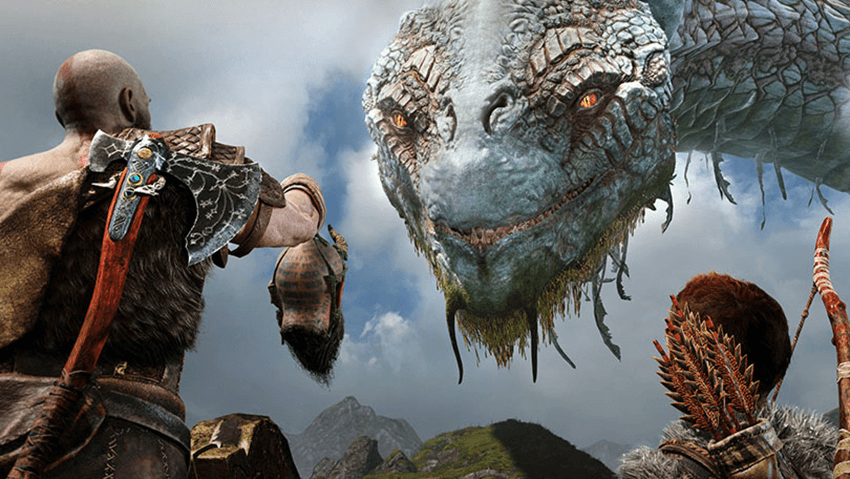An epic tale of Scandinavian myths and the father-son duo that fight them, God of War is a defining AAA game that pushes the boundaries graphically and thematically. Don Rowe reviews.
I wrote last month about German philosopher Immanuel Kant’s theory of the sublime, and how a select few games have transcended the medium by embodying it’s principles. I guessed God of War may be the best yet, reliant as it is on quite literally a Clash of the Titans sense of scale and perspective. Reader, I was right. God of War for the PlayStation 4 is an affirmation of gaming’s legitimacy as an art form on par with any other and a triumph of storytelling.
Protagonist Kratos is a man alone. As the shrouded corpse of his second wife burns, he comprehends for the first time his son, Atreus, seemingly an afterthought in his existence, and a disappointment at best. Kratos has a troubled history as a parent, having murdered his previous wife and daughter, and his attempts to right the wrongs of his past will inevitably clash with his nature, as cold as the tundra in which he now lives.
Together Kratos and Atreus must ascend the highest mountain in all the realms to scatter the ashes of the newly deceased, thus honouring her dying wish and giving us the start of a story. But there are old and established Gods in the north, and the World Serpent Jörmungandr is stirring. The middle child of the trickster Loki and his giantess wife, Jörmungandr encircles the world, clasping his own tail in his teeth. When the serpent awakes and releases his tail, as he does shortly into God of War, it signals the beginning of Ragnarok – Norse armageddon. It’s foretold that Thor will slay the serpent at the end of time before succumbing to its poison fangs as the world is submerged in water. Jörmungandr’s awakening is one of the most triumphant moments in gaming, a peak experience akin to something out of Dunkirk or the crescendo of an orchestral piece.
Against this mythic backdrop the pair must come to understand one another should they survive their journey. And it’s through this relationship that God of War leaves its most enduring mark. The pacing is superb, as Kratos softens towards his son, and Atreus comes gradually to understand the well of grief and anger inside his father over hours and hours of gameplay. Nothing feels forced, or gimmicky, and as in psychotherapy the gains made are incremental and precarious. But it’s not only through the script that the growing bond is illustrated. Just as Atreus asserts himself emotionally, so too does he improve in combat, at first from the sidelines and increasingly in a symbiotic dance with Kratos. Before long Atreus is in the thick of it, jumping from Kratos’ shoulders, strangling opponents and calling down ethereal spirits to aid in the fight – essential developments as the difficulty increases.
Kratos himself is undeniable. Armed now with the Leviathan Axe – a customisable weapon modeled on Thor’s hammer Mjölnir – he moves through an array of magically-imbued attacks, chaining together combos that are among the most weighty and satisfying in gaming. Of course, this being God of War, there’s plenty of gratuitous violence in his Mortal Kombat-esque finishing moves; curb stomps, decapitations, dismemberment, literally tearing foes in half – Kratos is a finisher through and through. The system is accessible and easy to learn, with increasing complexity as more features become apparent, but it’s at higher difficulties where it really elevates itself from the pack. Survival becomes a matter of utilising every trick in the arsenal, from parries to magical ‘runic’ attacks to synchronising blows with Atreus’ ranged assistance. Timing is everything.
The gear Atreus and Kratos use can be upgraded at any of a number of magical forges, manned by a pair of grouchy but amicable dwarfs who seem to always be a step ahead of our protagonists. In the manner of a Souls–Borne they have their own backstories, non-essential but rich in lore and context. After slogging through dungeon after dungeon of grimdark fantasy beasts, it’s refreshing to chat shit with a couple acerbic smithies, foul-mouthed and witty as they are. Though the language is coarse, blessedly absent is the gratuitous sexism of earlier installments – Kratos is a changed man and sex minigames are so last generation.
Though limited, the supporting cast as a whole are fleshed out and well-rounded, from a maniacal and tattooed demigod with a chip on his shoulder to a witch living inside a giant turtle, they expose the audience to a proto-Scandinavian mythology that forms the basis of modern fantasy – the Lord of the Rings is a love letter to this mythos, perhaps influencing life in New Zealand more than the Mediterranean pantheon of the previous God of War games, or for that matter any other.
And, like Lord of the Rings, God of War is a work that will endure. A story worthy of the material from which its inspired, set in a world pushing the limits of graphical capabilities, this is gaming at its highest point. We’re well past Game of the Year territory at this point, God of War is a statement and a testament, an antidote to the underwhelming AAA releases of the past few years and a truly sublime piece of art.
This post, like all our gaming content, comes to your peepers only with the support of Bigpipe Broadband.
